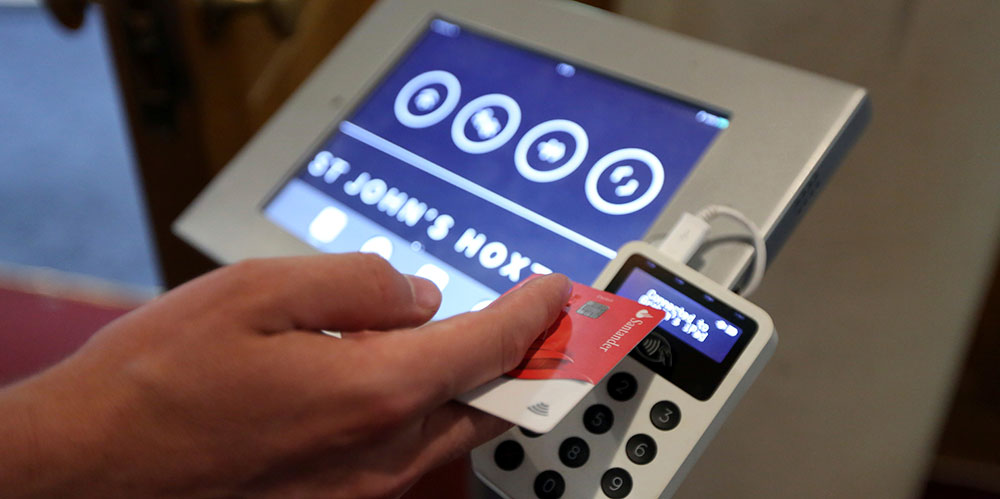
In this photo taken on Thursday Aug. 2, 2018, Aaron Rodewald, an operations and finance manager at St. John’s Church, demonstrates a device that allows churchgoers to donate money using contactless payments, in Hoxton, London. Thousands of Christian churches across the world are now using portable card readers or apps to take donations as people increasingly stop carrying cash on them. The Church of England says 16,000 religious sites now have access to portable card readers. In the U.S., hundreds of churches have installed kiosks where the faithful can swipe a card to donate. (AP Photo/Robert Stevens)
Thousands of Christian churches across the world are now using portable card readers or apps to take donations as people increasingly stop carrying cash on them.
The Church of England says 16,000 religious sites now have access to portable card readers. In the U.S., hundreds of churches have installed kiosks where the faithful can swipe a card to donate. Others are popularizing smartphone apps where money can be sent over at any time.
“How we pay for things is changing fast, especially for younger church-goers, who no longer carry cash, and we want all generations to be able to make the most of their place of worship,” said John Preston, the Church of England’s national stewardship officer.
The technologies vary from donations via a website to apps and physical screens set up at the church. The contactless card reader, which can be passed around the pews like the traditional offerings plate, is a newer evolution that the Church of England, in particular, has been adopting.
It struck a deal with contactless payment companies iZettle and SumUp to create a system that all its religious sites can install. It takes Apple Pay and Google Pay but can also be used with a PIN code if needed.
The innovation seems to be yielding good results.
A startup that makes donation apps for churches in France says that the average contribution is two to six times higher than cash donations. Obole Digitale’s smartphone app is used by 34 dioceses that represent over 5,000 churches in the country.
That may also be due to the fact that electronic donations tend to be worth more than the small change people carry in their pockets.
St. John’s church in London has a contactless card reader with preset donation sums ranging from 5 to 50 pounds ($6.50 to $65.50).
Graham Hunter, the vicar for St. John’s, says about a quarter of all voluntary donations are now via contactless payments.
He adopted the new technology after noticing open-air market traders in London using contactless readers for payments.
“In everyday life, people go into cafes and into supermarkets and they’re used to paying with contactless all the time,” he said.
His congregation includes 23-year-old Zoe Mathias, who rarely carries cash unless she’s lost her debit card.
“I’m very glad that our church has entered into the 21st century with contactless payment,” she said.
The money raised is used for building upkeep, children’s activities and to stage events for the local community.
Hunter said the church realized it had to make up for a drop in cash donations and that technology is helping to do that.
He hopes embracing innovations like contactless card payments will show churches can be modern, forward-thinking places. St. John’s once installed a free public wi-fi zone in its garden, so passersby could surf the web while on their lunch break.
“The Bible describes God as the chief technical officer, the CTO, a chief technician, an architect of all that is to come. So, God is creative and produces new technologies and so should we,” said Hunter.
